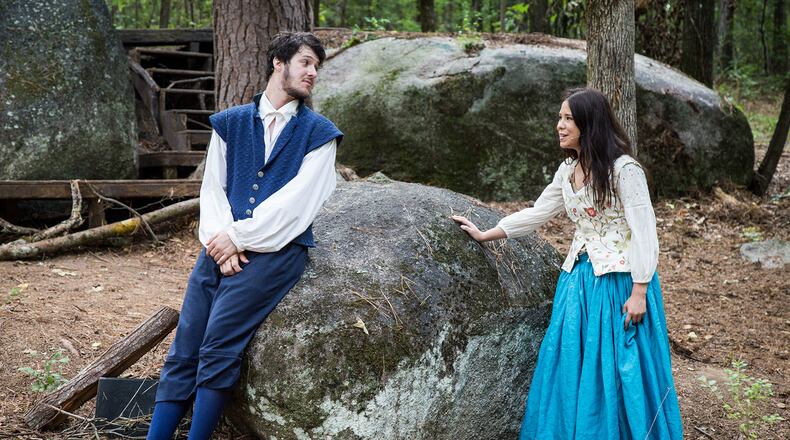The Serenbe Institute for Art, Culture & the Environment, which oversees the Serenbe Playhouse, has laid off the entire staff of the innovative outdoor theater company, amid charges that the company maintained a racist environment.
“It’s clear that the culture was pretty toxic for actors that were in the (productions),” said Deborah Griffin, chair of the Institute.
Griffin said comments on social media from actors and others reveal the intolerant attitudes prevalent behind the scenes. “That stuff is clear on the Facebook posts.”
The theater company has been the target of a host of complaints on social media in the past two weeks, many of them aimed at founder and former artistic director, Brian Clowdus, who left Serenbe last year to focus on his own production company, Brian Clowdus Experiences.
Serenbe is a planned community near Palmetto, about 30 miles south of Atlanta.
The Serenbe Playhouse was created in 2009 to stage outdoor theatrical productions, and has gained national attention for its large-scale spectacles.
Serenbe’s musical version of “Titanic” was staged in a lake and on a four-story set built to look like the famous ship; its production of “Miss Saigon” included a full-size helicopter.
Griffin said complaints about the hostile environment at Serenbe Playhouse came to the board’s attention in the last two weeks.
Patrons of the theater company were informed in a letter Wednesday about the purge. The playhouse suspended operations and the staff was let go on Monday.
The letter states “it has recently come to our attention through numerous, and very serious allegations, that our beloved experiences may possibly have come hand-in-hand with a culture that has been fraught with poor working conditions, racial and gender discrimination.”
Griffin, who has lived at Serenbe for five years, said “we heard the Atlanta arts community loud and clear. They wanted a clean start. The culture needed to be reformed.”
There were about seven people on staff at Serenbe Playhouse, said Griffin.
Last week Tara Moses, a Native American theater professional who directed last summer’s “The True Story of Pocahontas,” posted a lengthy critique of Serenbe’s behavior toward her, and its treatment of the story.
Serenbe, she suggests, hired her to appear sensitive to the essentially tragic history, but really wanted a Disney version of Pocahontas. They were, she writes, “using my face and my tribe to sell tickets.”
Though the play was well-received, she wrote, “I can only imagine how much better it could have been should we not have been dealing with racism.”
Lilliangina Quinones, a cast member of a Brian Clowdus Experiences production of “A Christmas Carol” from 2018, writes on her Facebook page that Clowdus tolerated racist jokes from a fellow cast member, including horse-play with a “Tar Baby” doll and conversations in an exaggerated “Deep South Negro dialect.”
The production was staged at the Wren’s Nest, the house museum and one-time home of Joel Chandler Harris, author of the Uncle Remus stories.
On June 4, Clowdus posted on his company’s Facebook page a statement of support for the Black Lives Matter movement, and an apology of sorts, that read:
“We admit that we have not set issues of race and inclusion as a priority in our company mission statement and values and that we have not adequately engaged Black voices in telling our stories.
As a young and developing company, we commit to making diversity a core facet of our experiences, integrating inclusion into our mission and core values.”
Several attempts by the AJC to reach Clowdus were unsuccessful.
Serenbe was one week away from launching a late March production of “Spring Awakening” when the COVID-19 outbreak prompted a statewide shutdown.
The Playhouse has now canceled all shows for the rest of the year. The letter to patrons says that tickets already sold for this year’s performances will be “moved to a future performance.”
The same letter states that Serenbe will be working with a “diversity, equity, and inclusion practitioner” to help create a “culture that supports all voices at the table.”
Should it become apparent that changes at the bucolic community’s theater group need to go farther, including changes to the board of the institute, Griffin said she would enact those as well, even if it meant resigning.
“We are looking at everything that could possibly contribute to this,” she said. “If anything were to turn up that showed me to be complicit in any of this, I would follow any changes that needed to be made to get this right.”
About the Author
Keep Reading
The Latest
Featured





